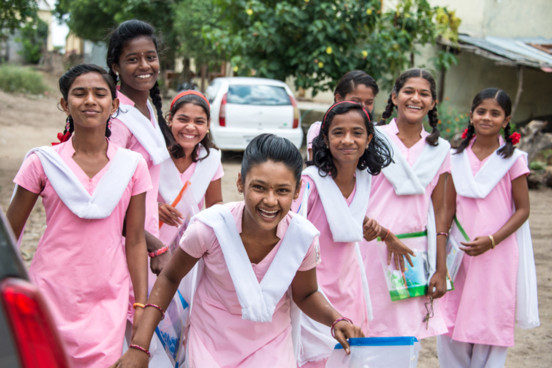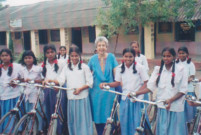
Dubai: If many follow the saying of how teaching to fish would put dinner food at the table every night, Armene Modi believes giving a bicycle is equally important.
Modi, founder and chairperson of Ashta No Kai (ANK), has introduced a new concept to boost girls’ enrollerment at schools in rural areas of a vast country like India. This has not only delayed the possibility of early marriages, but also give the girls the power to dream big of a better tomorrow for themselves and their societies.
“I didn’t train the girls to ride bicycles. I (just) gave them bicycles,” Modi told Gulf News.
Today, the brainchild project of a the white-haired soft spoken woman is looked at as a model that can be copied in other parts of the world, especially in regions where girls don’t receive equal treatment like boys when it comes to going to school. In third world countries, many girls are not getting same opportunities of boys either for many reasons. It is either because the family is poor and thinks teaching the girl won’t help unlike the boy, or because the school is too far away and for safety reasons the family thinks it is better to keep girls at home, or may be because there are no toilets for girls at school, as Modi wrote in one of her papers.
The story goes back to 1997, when Modi was living in Japan where she taught at universities for nearly 11 years. She was inspired by the book “May You Be the Mother of a 100 sons”. The book, which is written by former Washington Post Reporter in India Elisabeth Bumiller, tells the stories of several women, speaks the realities of their lives in different areas and on different levels ranging from villagers to intellectuals and Bollywood stars.
Literacy rates among women was one of the issues raised in the book.
Illiteracy rates among little girls in rural India was also one of the issues that attracted the attention of Modi, who obtained her BA in English Literature form Pune University and her MA in TESOL from Teacher’s college at Columbia University in New York.
She went back to her city and established “Ashta No Kai” project in 10 villages in Shirur Country, Pune District, India. The name is Japanese and it means ‘for a better tomorrow”.
Modi gave it a Japanese name, “because 900 Japanese supported me with funds for 10 years,” she said. Afterwards, private donors, rotary clubs and some corporates are support the project, Modi said.
At the beginning, ANK concluded that many girls in its target villages lived between four to seven kilometres away from the nearest high school, a fact that stop girls from continuing their education beyond
She explained that her office is nearly 55 kilometres away from the villages the organization is keen to send its daughters to school.
Ashta No Kai’s bicycle Bank, where nearly 1000 bicycles are being lent to girls to use to go to schools, has enabled 10000 adolescent rural girls to complete their high school education. The enrolment rate for girls in ANK village schools is almost 100 percent. The organization’s Scholarship program, which started in 2003, has helped more than 1,050 village girls to even pursue education beyond high school.
Asked if has plans to implement the project in other parts of India, Modi said “no. it takes a huuuuuge effort to work in the 10 villages I am in.”
Modi has just completed her Global Master of Arts Program at Tufts University’s Fletcher School of Diplomacy. She was also selected among four 2017 Echidna Global Scholars by Washington, D.C.-based Brookings Institute.
Commenting on the similarities and differences among different regions of the third world countries, Modi replied “yes, many similarities in obstacles, poverty, child marriage, poor infrastructure” among other issues.
Modi, who is a mother of two adult girls, received several national awards for her contributions to the empowerment of rural women.
ANK has also offered Kishori Mandals meetings, where adolescent girls were offered platforms to build self-confidence and received inputs in life skills.
One way of showing little girls how to defend themselves was to offer them Karate lessons, especially with increasing incident of violence against women and rape cases in some parts of India.
“Initially, there was a bit of resistance from parents who were not willing to send the girls to learn karate. However, when several of the girls won silver and gold medals at district, national and international meets, more parents agreed to enrol their daughters in the class,” Modi wrote.
Asked about her next step, Modi told Gulf news, “at the moment I don’t have an idea beyond wanting to start a Power Girls Brigade to spread the message in our life skills course through Peers to other girls.”













